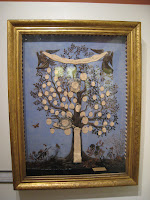 Tomorrow morning, well before dawn, C will take me to the airport to begin the three-flight journey to my hometown. He and the girls will follow the next day. The dogs are going to spend the holidays with Madame Puppies (who just got a new puppy; I expect Wendy and Alice to sleep for half of January). I've cleaned off the terraces--put away the porch furniture, tucked the gardening tools into their chest, cut back the geraniums. I've got three more errands to run this afternoon. And, oh, yes, I've got to pack.
Tomorrow morning, well before dawn, C will take me to the airport to begin the three-flight journey to my hometown. He and the girls will follow the next day. The dogs are going to spend the holidays with Madame Puppies (who just got a new puppy; I expect Wendy and Alice to sleep for half of January). I've cleaned off the terraces--put away the porch furniture, tucked the gardening tools into their chest, cut back the geraniums. I've got three more errands to run this afternoon. And, oh, yes, I've got to pack.We've not been Stateside for well over a year. It's lots of longests: the longest we've ever been abroad continually, the longest we've ever gone without seeing C's family (not the whole time; just the last six months), the longest I've ever gone without staying in my mother's house. As long as it's been for us, it's longer, proportionally, for E and G, a longer stretch out of their shorter lives. E is so excited she can hardly finish a sentence. Myself, I haven't slept through the night in days. I wake up around 4 and listen for the church bells, and run through lists until I doze again. We're looking forward to being with our famille éloignée, of which there is a lot, we hope to have a moment with everyone.
One of the disorienting things about living overseas is that, although you're living, in our case, at least, in a place saturated with history, your own history fades a bit. The places that inhabit your memory are out of sight, and the people who remind you of your past are missing. Of course there's our immediate family, but they are immediate, of the present, now, what's the right verb form for this sentence and do we need buttermilk? There's not a lot that reminds us of our past, and the present demands our full attention.
This week, L's grandmother died. She was of a venerable age and has been failing for a long time. I've been on the phone and in email contact with L more since her grandmother died than in the last six weeks, sorting out travel plans and funeral arrangements. The service will be where L's grandmother lived, in my hometown which is also L's, and, through this trick of fate, C and the girls and I will be able to attend it. I've known L's family since I was the girls' age, even before. Many of the people I'll see at the service that day, and at dinners and on walks and over cups of tea on the other days, will have known me since I was my daughters' age, or before. They'll remember things about me that I've forgotten myself. I'll remember things about them, too, moments from two decades ago when they knocked over the dessert table while reaching for the banana pudding (you know who you are), or when they went on vacation and left the front door open (note to self), or when they said to me and my husband and my babies: Come see us any time. We'd love to have you. Away this long from my identity and history as the daughter of a Southern family in a Southern town, I'll walk back into it, like putting on a coat that already has lip balm in the right pocket.
The French, you know, are famous for taking their vacations. C's colleagues have weeks and weeks of vacation every year, six or seven or eight. His office here will close, computers off, lights out, doors locked, for the span of the holidays. Taking vacations is serious business. Following the French method, I'll be closing up La Bastiole for a couple of weeks. I want my extended family to be able to relax around me and not worry that I'm going to write about them later that day (I'll wait a while, and change the names). But I'll be back, long about January 5. Whatever you celebrate between now and then--and I hope you do celebrate something, regardless of what you believe, even if you don't believe; it's dark and cold outside, and it's better to be inside in light and warmth, and better still in light and warmth with people you love and someone's family recipe for something--I hope you celebrate it well. We'll be marking Christmas and Hanukkah and New Year's, a lot of occasions, but then, we've a lot to celebrate, a lot to say thank you for.
And I'll be back in January. Come by any time.





















































